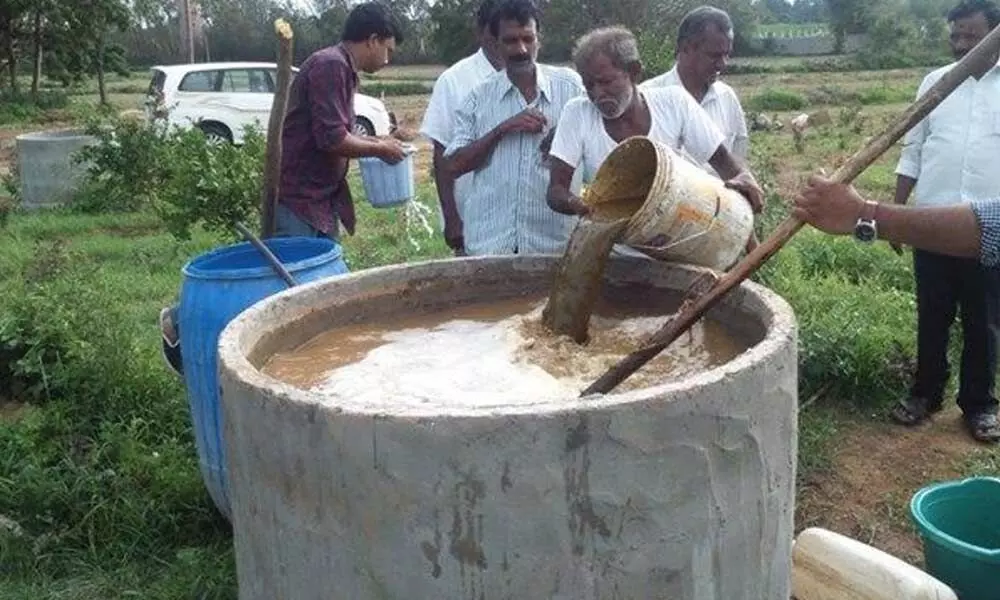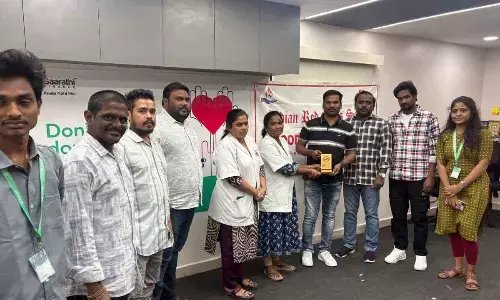Natural farming gathers steam in Anantapur

Jeevamrutham prepared by farmers in a village
- Agriculture department says about 200 villages under 20 clusters benefitting 1 lakh farmers have been declared as 'natural farming' villages
- In each cluster, 10 villages have adopted natural farming methods and techniques and has completely done away with the use of chemicals and fertilizers
Anantapur: Department of Agriculture, NGOs and educated individual farmers inspired by campaigners for natural farming like Khadder Valli etc and private agriculture research agencies have all done their part in bringing awareness and popularising natural farming concepts, 'natural farming' has become a buzz word in the district. Even software techie-turned-natural farmer Parthasaradhi too had been working on the concept and roped in hundreds of farmers into the movement and was instrumental in the constitution of farmers producers organisations exclusively with natural farmers.
About 200 villages under 20 clusters benefitting 1 lakh farmers have been declared 'natural farming' villages by the department of Agriculture in the district. The department's natural farming project is part of the government's plan to popularise natural farming and bring down the use of chemicals and pesticides in agriculture crops. As part of it, it is promoting natural farming cluster villages which will raise plantations and agriculture crops through natural farming manure. In each cluster, 10 villages have adopted natural farming methods and techniques and has completely done away with the use of chemicals and fertilizers. In a phased manner, the concept of organic farming will be expanded to throughout the district, depending upon the enthusiasm of farmers.
In each cluster, 5,000 farmers from 10 villages are implementing the natural farming methods. As many as 10 clusters are operating and declared as 'natural farming zones' involving about 50,000 farmers and covering an acreage of 2.50 lakh acres.
The villages include Vajrakarur, Kambaduru, Raptadu, Somandepalle, Amadaguru, Madakasira and other surrounding villages. Agriculture officer Lakshma Naik told The Hans India that 'Jeevamrutham' an amalgamation of animal dung, urine and botanical waste is being used by farmers replacing chemicals and pesticides to a great extent. Farmers, who have seen the benefits of natural organic farming, are moving away from highly chemicalised farming to organic farming by using only animal dung and agriculture waste as manure and using 'Jeevamrutham.'
Farmers in organic clusters are raising horticulture crops, vegetable, mulberry, groundnut and even millets adopting natural farming techniques. The farmers are educated on the benefits of natural farming and those who have taken to organic fertilizers are themselves spreading the good news associated with it. He stated organic farming reduces cultivation costs, boosts soil health and increases the yield of crop apart from contributing to human health.
Farmers in Uravakonda mandal are excited about organic farming has negated all the evils of chemicals and pesticides. Ramana, a farmer of Uravakonda mandal says that organic farming is 80 per cent cheaper than fertilizer farming. Ramana revealed that he spent a mere Rs 25,000 on organic inputs and his profit turned out to be Rs 3.50 lakhs on his 4-acre crop.
A 3-member committee appointed by the department of Agriculture is guiding and overseeing the smooth transition from chemical fertilizers to organic farming.

















